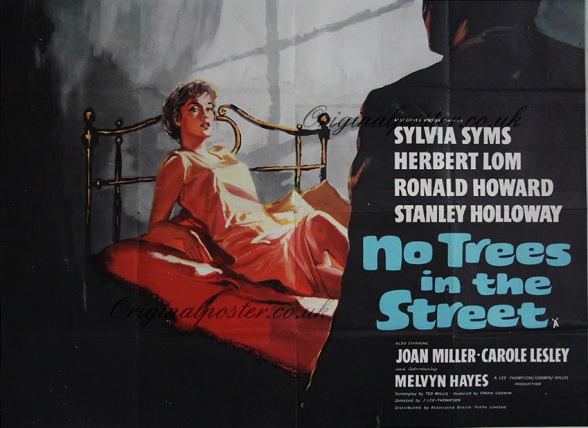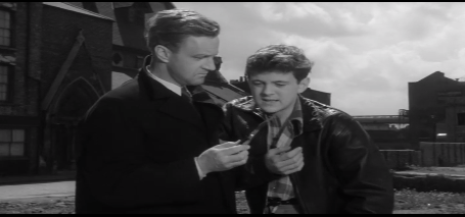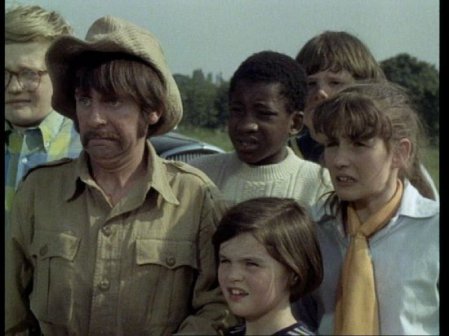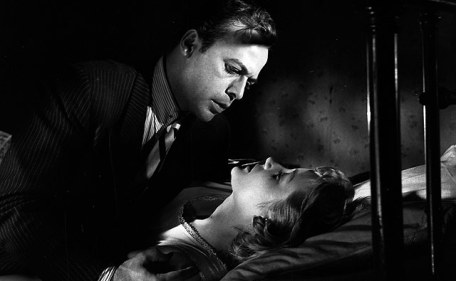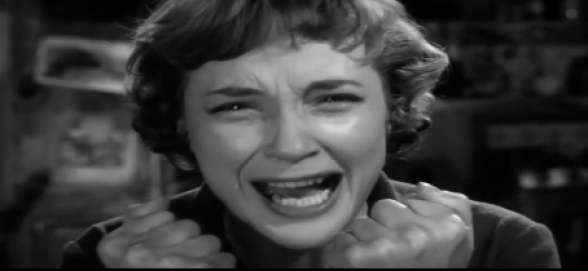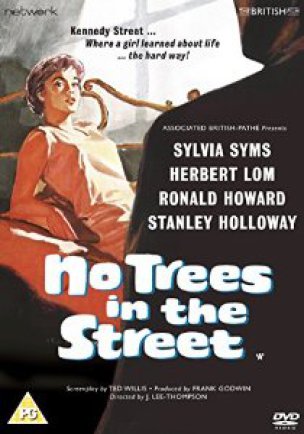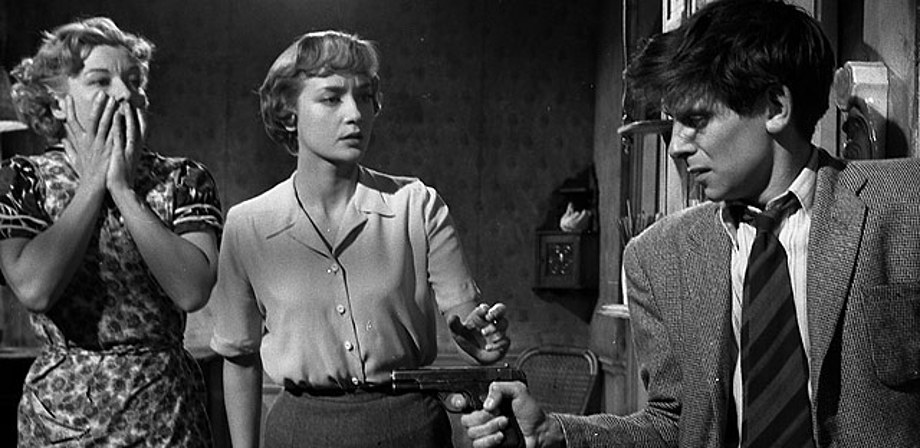
NO TREES IN THE STREET (1959)
No Trees in the Street, directed by the Bristolian J Lee Thompson (known as J Lee presumably because John Thompson is rather mundane, I might ask to be known in future as P Stephen Thompson or, even better, Paul S Thompson) is a rather overheated crime melodrama, which, when it isn't being horribly moralistic, is a pretty entertaining yoof crime film which provides substantial roles for both Herbert Lom and Sylvia Syms, two favourites of mine.
John Hill, in his book 'Sex, Class and Realism' divides the social problem film into two basic sets in the period 1956-1963; those of Dearden and Relph (for which see my page elsewhere on this website) and those of the scriptwriter/playwright Ted Willis, the creator of Sgt Dixon of 'Dixon of Dock Green' fame amongst other things. No Trees in the Street is written by Willis from his own play; I don't know the play, but the film starts off badly by deploying that most annoying of devices, the 'bookends', last seen by me, to equally poor effect, in Good Time Girl where Diana Dors is on the receiving end of a tedious homily from Flora Robson, with the moral fable taking up the bulk of the screen time.
The bookend in No Trees... features Ronald Howard and a very young David Hemmings, the latter a hot-headed youth prone to remarks such as "That's all you old blokes can think of, knock off the young 'uns" and the former a police officer who is so painfully liberal and willing to lecture 'the kids' at the drop of a hat that you almost wish he'd just give 'em a clip round the ear like in the good old days. The lecture in this instance involves 'how it used to be' 20 years before, (ie 1937/1938) when Somerset Street, where they are standing now, was Kennedy Street....
Dissolve to a working class street in the late 1930s (or rather a set designer's vision of a working class street in the late 1930s) and we are introduced to the Martin family - mum Jess, daughter Hetty (Syms) and sprog brother Tommy (Melvyn Hayes). The household is completed by Liam Redmond as blind Bill, annoyingly prone to playing the mouth organ at moments of tension (who he is, and what his relationship is to the rest of the family, I'm afraid I didn't work out) with Kipper (Stanley Holloway) dropping in from time to time, usually with hard liquour and a music hall song to cheer everyone up - not. Again, I couldn't work out what his relationship was to Jess and the others, maybe they didn't care as long as he brought beer with him.
Life is hard in Kennedy Street, and Tommy (Hayes) is flitting from one job to another, but on the look out for the main chance by doing some pilfering and petty thieving on the side, much to the despair of his sister Hetty (the achingly beautiful Syms). Howard plays DS Frank Collins, looking out for Tommy and trying to help him on his feet, although someone else is also trying to help him - Wilkie (Lom), the local smooth 'gangster', running the bookies whilst handling stolen goods and indulging in other illicit pastimes. But unlike Frank, Wilkie is no philanthropist; he is obsessed with Hetty and is trying to win her over by helping Tommy. In this scene Wilkie gives Tommy his chance:
This was one of Hayes' earliest roles; he was presumably a big fan of Method Acting back then, he's so thin and frail that it feels as though he has deliberately starved himself (and got rickets into the bargain) in order to empathise, De Niro-style, with his character. This was all a long time before his best and most famous role, the pinnacle of his career - Albert in 'Here come the Double Deckers!' (see above).
Tommy of course falls in with a bad lot, and double crosses Wilkie, which is not a great idea, but with all the impulsiveness of youth (Hayes was however well into his 20s when he made the film) he spends it on a new suit, a slap up meal and throws the rest of it around like confetti, although he has also managed to obtain another item...
Herbert Lom as Wilkie is a standout here; I found Wilkie's character quite intriguing and far more rounded than would be usual in such a film. OK, he's a bad 'un, but we can see glimpses of a more positive side of his character, and there's no doubt he is devoted to Hetty - possibly because, in a perverse way, she's the one he wants that he can't have - and he perhaps garners more sympathy than would normally be the case as we see precious little of his 'business' activities so it is hard to gauge how much of it is strictly criminal and how much of it is simply him running a harsh, competitive business in a harsh, competitive world (no doubt whilst pulling strokes and taking liberties, as Ian Dury would say). It is certainly a great relief not to have him running a nightclub, as he does in 90% of his other films.
He is nothing if not persistent in his pursuit of Hetty, as this scene shows:
The path of true love though is clearly not going to run smoothly, and Wilkie, surrounded by dissenting voices from the likes of his sidekick Jackie (Edwin Richfield)
and the wonderfully named Lova (Carole Lesley), becomes suspicious of Hetty's friendship with Frank, finally humiliating her in a scene where a great deal of sympahty we might have had for him is
lost.
To say much more would give away the plot and the ending, but even I can work out that with an unstable kid with a gun on the loose, it's not going to turn out nice again. We end up back in 1958, as Collins finishes his tale, and get an idea of how things turned out for Hetty, although disappointingly not for Wilkie.
The film was not particularly well received at the time, one guide referring to its 'artificiality of plot and dialog. (sic) Characterizations are reduced to mere stereotypes'. The director didn't help really; he was quoted in the trade journal, Kine Weekly, at the time as stating 'We are saying, in effect, stop your silly whining, look at what it used to be like' - not comments that would particularly encourage its target audience to seek it out, one would have thought.
The Blackadder version of the Duke of Wellington would certainly approve of the script and performances, there being a great deal of shouting throughout, and anyway I would already have had a headache from the blaring music of Laurie Johnson at the start before I'd even taken a sip of my Kia-ora.
On the plus side, Gilbert Taylor's cinematography in the new DVD release is razor sharp and there's plenty of noir shadow lighting to keep me happy, whilst Lom and Syms are always worth watching. I had an old copy recorded off TV for many years, but it's just been released by Network on Air for about £7, another welcome addition to the rediscovered films of this period.
